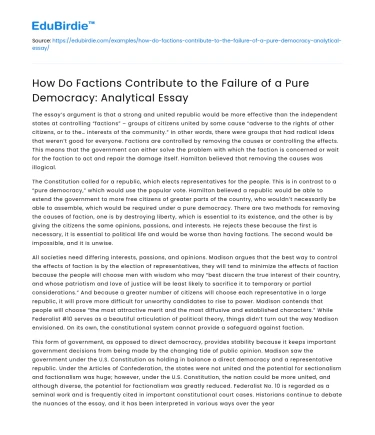The essay’s argument is that a strong and united republic would be more effective than the independent states at controlling “factions” – groups of citizens united by some cause “adverse to the rights of other citizens, or to the… interests of the community.” In other words, there were groups that had radical ideas that weren’t good for everyone. Factions are controlled by removing the causes or controlling the effects. This means that the government can either solve the problem with which the faction is concerned or wait for the faction to act and repair the damage itself. Hamilton believed that removing the causes was illogical.
The Constitution called for a republic, which elects representatives for the people. This is in contrast to a “pure democracy,” which would use the popular vote. Hamilton believed a republic would be able to extend the government to more free citizens of greater parts of the country, who wouldn’t necessarily be able to assemble, which would be required under a pure democracy. There are two methods for removing the causes of faction, one is by destroying liberty, which is essential to its existence, and the other is by giving the citizens the same opinions, passions, and interests. He rejects these because the first is necessary, it is essential to political life and would be worse than having factions. The second would be impossible, and it is unwise.
Save your time!
We can take care of your essay
- Proper editing and formatting
- Free revision, title page, and bibliography
- Flexible prices and money-back guarantee
All societies need differing interests, passions, and opinions. Madison argues that the best way to control the effects of faction is by the election of representatives, they will tend to minimize the effects of faction because the people will choose men with wisdom who may “best discern the true interest of their country, and whose patriotism and love of justice will be least likely to sacrifice it to temporary or partial considerations.” And because a greater number of citizens will choose each representative in a large republic, it will prove more difficult for unworthy candidates to rise to power. Madison contends that people will choose “the most attractive merit and the most diffusive and established characters.” While Federalist #10 serves as a beautiful articulation of political theory, things didn’t turn out the way Madison envisioned. On its own, the constitutional system cannot provide a safeguard against faction.
This form of government, as opposed to direct democracy, provides stability because it keeps important government decisions from being made by the changing tide of public opinion. Madison saw the government under the U.S. Constitution as holding in balance a direct democracy and a representative republic. Under the Articles of Confederation, the states were not united and the potential for sectionalism and factionalism was huge; however, under the U.S. Constitution, the nation could be more united, and although diverse, the potential for factionalism was greatly reduced. Federalist No. 10 is regarded as a seminal work and is frequently cited in important constitutional court cases. Historians continue to debate the nuances of the essay, and it has been interpreted in various ways over the years. However, it remains a foundational work highlighting the value of national unity through republicanism.






 Stuck on your essay?
Stuck on your essay?

